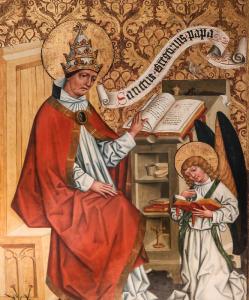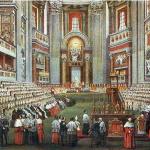The word “pope” and also the word “patriarch” (usually applied to bishops in Eastern Catholicism or Eastern Orthodoxy) both derive from the ancient Greek word páppas, originally an affectionate term meaning “father”. According to Wikipedia (“Pope [title]”):
The earliest record of the use of this title is in regard to the Patriarch of Alexandria, Pope Heraclas of Alexandria (232–248) in a letter written by his successor, Pope Dionysius of Alexandria, to Philemon, a Roman presbyter . . . From the early 3rd century the title was applied generically to all bishops. The earliest extant record of the word papa being used in reference to a Bishop of Rome dates to late 3rd century, when it was applied to Pope Marcellinus.
As with many other technical or titular terms not found in the Bible (either in English or Greek), such as Trinity, original sin, virgin birth, etc., the concept is present whether or not one particular term or title is. We see the concept of pope applied to Peter by the Church fathers, in commenting on biblical Petrine passages. The New Testament was written in Koine Greek, the common language spoken after the conquests of Alexander the Great in the fourth century BC, during the Hellenistic period, in the Roman Empire and in the early Byzantine Empire. It replaced the ancient Greek dialects.
The word páppas was an Ancient Greek term. A Wiktionary article on the later form of this word, pápas — or “pope” (medieval Latin, papa) noted that it was present in Late Koine Greek and Byzantine Greek. So it isn’t found in the New Testament, which used language that was later than Ancient Greek and before Late Koine Greek. This explains why it doesn’t appear in historical Christian use until the early 3rd century AD. But of course, the concept is there in the Bible, and the usual word used for “father” is pater (Strong’s Greek word #3962). It’s translated “father” 418 times in the KJV. Like virtually all biblical words, it has multiple meanings, but the aforementioned article on the word notes one form, relevant to our discussion:
one who has infused his own spirit into others, who actuates and governs their minds
one who stands in a father’s place and looks after another in a paternal way
a title of honour
teachers, as those to whom pupils trace back the knowledge and training they have received
This meaning could be construed as “papal.” And so we see St. Paul using it in this manner:
1 Corinthians 4:15-16 (RSV) For though you have countless guides in Christ, you do not have many fathers. For I became your father in Christ Jesus through the gospel. [16] I urge you, then, be imitators of me.
Philippians 2:22 But Timothy’s worth you know, how as a son with a father he has served with me in the gospel.
1 Thessalonians 2:11-12 for you know how, like a father with his children, we exhorted each one of you and encouraged you and charged you [12] to lead a life worthy of God, who calls you into his own kingdom and glory.
Therefore, St. Paul in this sense of theological and spiritual guidance, was a “father” (or “pope”: originally meaning the same thing) to the Corinthian and Thessalonian congregations, and to Timothy. The same concept in different words occurs when St. Paul calls Timothy “my son” twice (1 Tim 1:18; 2 Tim 2:1), and “my true child in the faith” (1 Tim 1:2), and “my beloved and faithful child in the Lord” (1 Cor 4:17). Paul is even more descriptive along these lines, in another related passage:
Philemon 1:10-13 I appeal to you for my child, Onesimus, whose father I have become in my imprisonment. [11] (Formerly he was useless to you, but now he is indeed useful to you and to me.) [12] I am sending him back to you, sending my very heart. [13] I would have been glad to keep him with me, in order that he might serve me on your behalf during my imprisonment for the gospel;
St. Peter, likewise, refers to “my son Mark” (1 Pet 5:13). The Protestant Jamieson-Fausset-Brown Bible Commentary notes about this passage:
Papias reports from the presbyter John [Eusebius, Ecclesiastical History, 3.39], that Mark was [the] interpreter of Peter, recording in his Gospel the facts related to him by Peter. . . . That Mark had a spiritual connection with the Asiatic’ churches which Peter addresses, and so naturally salutes them, appears from 2Ti 4:11; Col 4:10.
Cambridge Bible for Schools and Colleges also states regarding 1 Peter 5:13:
It is natural, in the absence of any evidence to the contrary, to assume that the Marcus so named is identical with the “John whose surname was Mark,” the son of the Mary to whose house St Peter went on his release from imprisonment (Acts 12:12), the cousin of Barnabas (Colossians 4:10), the companion of St Paul on his first missionary journey (Acts 13:5). On this assumption the term “son” might be used of him either as implying the spiritual parentage of conversion, or as the expression of an affection like that which St Paul cherished for Timotheus (1 Timothy 1:2) and Titus (Titus 1:4).
St. John also thinks in the same way about spiritual fatherhood:
3 John 1:1-4 The elder to the beloved Ga’ius, whom I love in the truth. [2] Beloved, I pray that all may go well with you and that you may be in health; I know that it is well with your soul. [3] For I greatly rejoiced when some of the brethren arrived and testified to the truth of your life, as indeed you do follow the truth. [4] No greater joy can I have than this, to hear that my children follow the truth.
The same word (pater) in the Septuagint (3rd c. BC Greek translation of the Bible) was used by the prophet Elisha in addressing the prophet Elijah, when the latter went up to heaven in a fiery chariot: “My father, my father!” (2 Kgs 2:12), and one of the kings of Israel called Elisha “My father” (2 Kgs 6:21). Perhaps the most “papal” use of pater in the Septuagint is in Isaiah 22:21 (thanks to my friend Nicholas El-Hajj for pointing this out to me):
Isaiah 22:21 In that day I will call my servant Eli’akim the son of Hilki’ah, [21] and I will clothe him with your robe, and will bind your girdle on him, and will commit your authority to his hand; and he shall be a father to the inhabitants of Jerusalem and to the house of Judah. [22] And I will place on his shoulder the key of the house of David; he shall open, and none shall shut; and he shall shut, and none shall open.
In light of the etymological factors above, this is literally expressing the notion, “he shall be a ‘pope’ to the inhabitants of Jerusalem.” It’s all the more interesting because it’s part of a passage that Jesus clearly had in mind when giving St. Peter the keys of the kingdom: “I will give you the keys of the kingdom of heaven, and whatever you bind on earth shall be bound in heaven, and whatever you loose on earth shall be loosed in heaven” (Mt 16:19). Catholic apologist Suan Sonna does an exhaustive four-hour analysis of the typology of Isaiah 22 as related to the papacy in his video talk, “The New Eliakim Typological Argument for the Papacy” (7-14-22). See also my lengthy article, No Papacy in the NT? Think Again (vs. Jason Engwer). With Special Emphasis on the Protestant Exegesis of “The keys of the kingdom of heaven” (Matthew 16:19) [8-1-22], incidentally posted a little over two weeks after Suan’s video.
*
***
*
Practical Matters: Perhaps some of my 4,500+ free online articles (the most comprehensive “one-stop” Catholic apologetics site) or fifty-five books have helped you (by God’s grace) to decide to become Catholic or to return to the Church, or better understand some doctrines and why we believe them.
Or you may believe my work is worthy to support for the purpose of apologetics and evangelism in general. If so, please seriously consider a much-needed financial contribution. I’m always in need of more funds: especially monthly support. “The laborer is worthy of his wages” (1 Tim 5:18, NKJV). 1 December 2021 was my 20th anniversary as a full-time Catholic apologist, and February 2022 marked the 25th anniversary of my blog.
PayPal donations are the easiest: just send to my email address: [email protected]. Here’s also a second page to get to PayPal. You’ll see the term “Catholic Used Book Service”, which is my old side-business. To learn about the different methods of contributing (including Zelle), see my page: About Catholic Apologist Dave Armstrong / Donation Information. Thanks a million from the bottom of my heart!
*
***
Photo credit: Pope St. Gregory the Great (r. 590-604), by Lawrence OP (9-3-22). Detail from a medieval triptych in the Krakow Religious Art Museum [Flickr / CC BY-NC-ND 2.0 DEED license]
Summary: Fascinating history & commonalities of the word “pope” (derived from the ancient Greek, “páppas”) & the NT “pater” (father), used to refer to spiritual fatherhood.














